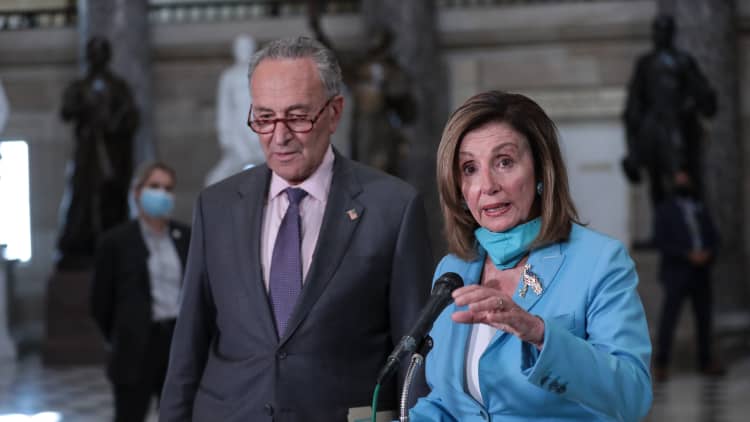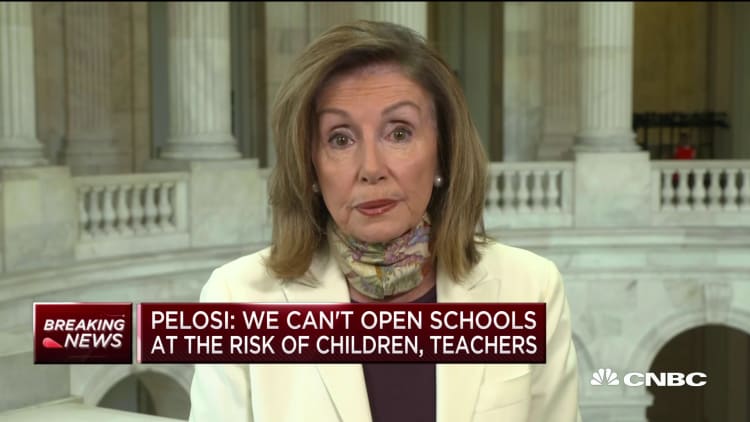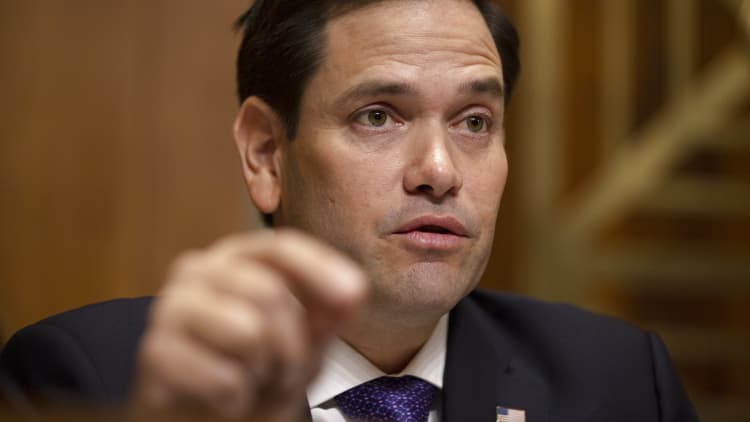The White House threatened to act on its own to provide coronavirus relief Wednesday after another day of talks with Democrats yielded no agreement.
Though the Trump administration apparently yielded ground in bargaining over extended unemployment insurance, a range of issues remained unresolved Wednesday after officials' latest meeting with Democratic leaders. Leaving a roughly two-hour huddle with House Speaker Nancy Pelosi, Senate Minority Leader Chuck Schumer and Treasury Secretary Steven Mnuchin, White House chief of staff Mark Meadows told reporters the sides had "no agreement."
Congress and the Trump administration have struggled to strike an aid agreement after the enhanced unemployment benefits and a moratorium on evictions from federally-backed housing expired in late July. Millions of Americans still unable to find work will now see a staggering drop in income until lawmakers can pass legislation.

In a CNN interview after Wednesday's meeting, Meadows said President Donald Trump would take executive action to extend both extra jobless benefits and the eviction moratorium if Democrats and the White House fail to strike a deal. The threat may be a negotiating tactic because it is unclear if Trump has the power to take those steps. Congress controls federal funding.
"If Congress can't get it done, the president of the United States will," Meadows told CNN.
After the talks, Schumer told reporters that Democrats "are not walking away" from discussions. The New York Democrat said the sides have "wide differences" as they struggle toward an agreement.
Pelosi would not give any assurances about how long it would take negotiators to strike a deal.
"I feel optimistic that there is a light at the end of the tunnel. But how long the tunnel is remains to be seen," the California Democrat told reporters.
On Tuesday, the Trump administration team offered to extend extra federal unemployment insurance into December at $400 per week, NBC News and Politico reported. The White House had floated keeping the previous $600 a week benefit for a week while negotiators hashed out a broader deal. Senate Republicans have proposed a plan that would set the insurance at $200 per week through September, then change the benefit to 70% wage replacement.
Mnuchin and Meadows also offered to extend the eviction moratorium into December, the news outlets said. Democrats cut their request for U.S. Postal Service funding to $10 billion from $25 billion, according to the reports.

The four negotiators also met with Postmaster General Louis DeJoy on Wednesday. Schumer said they had a "heated discussion" about ensuring efficient mail delivery when millions of Americans cast their ballots by mail in November during the coronavirus pandemic.
Spokespeople for the Democratic leaders and Trump administration officials did not immediately respond to requests for comment on the reported proposals. The concessions would mark some of the first progress on seemingly intractable issues since the GOP last week released its counteroffer to a House Democratic plan.
Despite the signs of movement toward a deal, Democrats and Republicans remain far apart on aid for state and local governments, funding for schools, and assistance for food, rent and mortgage payments, among other topics. Schumer also suggested Wednesday that he would not accept an agreement without an extension of the $600 per week jobless benefit.
"At the moment, however, the White House is not [supporting $600 a week], and we are not going to strike a deal unless we extend the unemployment benefits which have kept nearly 12 million Americans out of poverty," he said on the Senate floor.
It appears likely Congress will have to approve a bill with largely Democratic votes in both the GOP-controlled Senate and Democratic-held House. Senate Majority Leader Mitch McConnell, R-Ky., acknowledged Tuesday that his caucus has "divisions about what to do" to extend unemployment insurance.
The top Senate Republican also said he is "prepared to support" the deal Democrats and the White House strike, even if he has "problems with certain parts of it."

McConnell told reporters the Senate will stay in session next week and at least delay its planned August recess. The House has already pushed back its recess until Congress passes an aid bill.
Some Republican senators oppose even the $1 trillion proposal their party put forth last week. But others such as Sen. Marco Rubio, R-Fla., have said they would accept concessions.
"We have to act. We have to do something," he told CNBC's "Squawk Box" on Wednesday. "And that will require us to vote for a bill that has things in it that I may not necessarily like."
Rubio said "there's a limit" to what he would accept. He said he would oppose a package resembling the $3 trillion legislation House Democrats passed in May.
A handful of Senate Republicans have come around to bigger unemployment insurance payments than their party offered last week. Three GOP senators, two of whom face difficult challenges in November's election, introduced a bill Wednesday that stakes out a midpoint between the Senate Republican and House Democratic bills.
The plan from Sens. Mitt Romney of Utah, Susan Collins of Maine and Martha McSally of Arizona would allow states to choose whether to offer $400 or $500 per week in August. In September, they would pay $400 a week. Collins and McSally are running for election this year.
From October through December, they would offer 80% wage replacement. States could choose to get a waiver to pay out an extra $300 per week if their unemployment systems cannot handle setting a percentage of a worker's pay.
Democrats have questioned whether states can upgrade unemployment systems quickly enough to handle replacing a percentage of wages this year.


